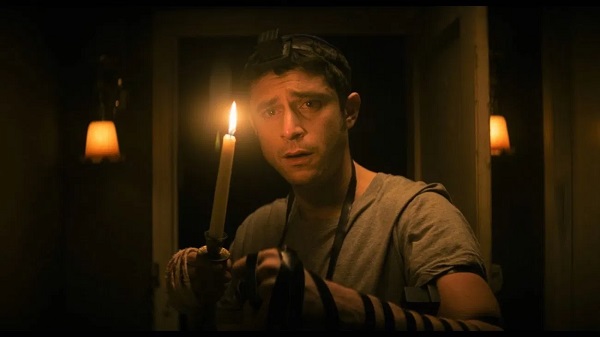
A limited setting, an ominous score, and a “things go bump in the night” storyline. All are three simple yet potent ingredients used to elicit fear in The Vigil, Keith Thomas’ feature directorial debut. Right as the movie begins, Thomas tries grabbing you from the get-go as the eerie score by Michael Yezerski plays during the walk that our protagonist Yakov (Dave Davis) and Reb Shulem (Menashe Lustig) go on as they head into the small house that becomes our house of fright.
After leaving his Orthodox Jewish community behind, Yakov is tasked with keeping vigil and acting as a “shomer,” a guardian who watches over the body of a deceased community member. Even if he left his community due to a traumatic occurrence, Yakov still takes on the task given to him by Reb Shulem, his former rabbi, so that he can pay his rent. Not too long after Yakov arrives at the residence of the widowed Mrs. Litvak (Lynn Cohen) is when things start to get eerie.
Yakov hears creaking sounds and experiences possible hallucinations as he wanders the halls. Initially, The Vigil leans too heavily on its minimalist approach as for a short while, it relies on the repetitive use of creepy sounds and jump scares with the pitch-black cinematography from Zach Kuperstein, and especially the entity that antagonizes Yakov, being used to create an unnerving feeling.
This entity, known as the Mazzikin, is a Jewish mythological figure that enacts varying degrees of harm on the person it targets. One that doesn’t have a face but acts more as a presence, haunting Yakov through artificial phone conversations as if it’s his conscience in order to force him to deal with the aforementioned tragic event that forced him to doubt his faith and distance himself from his community. Additionally, lead actor Dave Davis does a fine job at selling Yakov’s grief, letting his wide-eyed face show Yakov’s onerous agony over having to confront his troubled past.
That being said, the invisible Mazzikin ends up being the real star of the show as it allows The Vigil to take great advantage of its “less is more” execution. More so than the creaking sounds and jump scares that one can expect from a typical haunted house movie since its psyche-y presence draws it closer to the horrors of everyday life.
Along with its focus on the Orthodox Jewish experience, the boogeyman acting as a voice inside our peril-stricken protagonist’s head is what sets The Vigil apart from other horror pictures dealing with grief and trauma such as Hereditary and The Babadook. Because it’s undercut by the initial reliance on genre mechanics, The Vigil isn’t entirely as singular as it could’ve been. Yet, its attempt at showing how the path to moving on from our wrongdoings can start from within makes The Vigil an insidiously eerie yet affecting experience.
1 Comments
Leave a Comment
You must be logged in to post a comment.
very interesting topic, outstanding post.